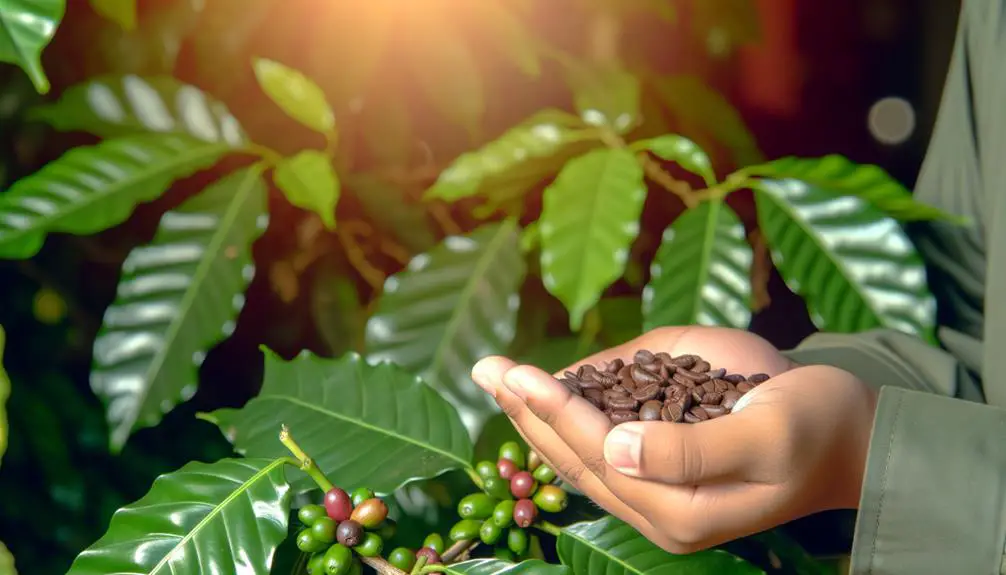While some argue that organic coffee is just a trendy, overpriced alternative to conventional beans, I’ve found that the discussion about its benefits extends beyond mere fashion.
As a dedicated coffee enthusiast and health-conscious individual, I’m constantly sifting through the latest research and perspectives on what we consume. It’s true that organic coffee often comes with a heftier price tag, but this prompts the question: does the value for our health justify the expense?
In considering the potential health benefits, one must also weigh the environmental impact of coffee farming and the presence of chemicals in non-organic varieties.
Stick with me as we explore whether your morning cup of organic joe is actually contributing to your well-being or simply satisfying a placebo effect.
Continue Reading to Understand These Key Points:
- Organic coffee is produced without synthetic pesticides or fertilizers, adhering to organic farming standards and promoting sustainability and a healthier ecosystem.
- Organic coffee has higher antioxidant levels due to the absence of synthetic pesticides and fertilizers, potentially offering health benefits.
- Conventional coffee production involves the use of synthetic pesticides and fertilizers, which may result in chemical residues on the beans and pose potential long-term health effects.
- Choosing organic coffee aligns with values of supporting biodiversity, reducing negative environmental impacts, and promoting transparency and trust in the production process.
What Is Organic Coffee?
Organic coffee refers to coffee produced without the use of synthetic pesticides or fertilizers, adhering to standards set for organic farming. These production standards are crucial as they ensure the sustainability of the coffee cultivation process and promote a healthier ecosystem. It’s not just about what’s not used; it’s also about following practices that maintain soil health, conserve water, and support biodiversity.
To verify that coffee meets these standards, a certification process is in place. This involves rigorous assessments by third-party organizations that examine the growing, harvesting, and processing methods to ensure they comply with organic farming requirements. The certification process is thorough, and it often includes regular farm inspections and detailed documentation.
As a consumer, when I see an organic label on a coffee product, it tells me the coffee was grown according to specific guidelines aimed at minimizing the impact on the environment. The absence of synthetic chemicals also suggests a reduction in potential health risks for both the consumer and the farmworkers who cultivate the coffee. It’s essential to understand that organic certification is a testament to the quality and sustainability practices behind a product, providing transparency and trust in the coffee I choose to drink.
Health Benefits Examined
Understanding the methods behind organic coffee production, I’m now curious about the potential health benefits such practices may offer to consumers like myself. In particular, I’ve learned that organic coffee often boasts higher antioxidant levels due to the absence of synthetic pesticides and fertilizers. These antioxidants are crucial as they help combat oxidative stress in the body, which is linked to numerous chronic diseases.
Research suggests that organic farming practices may lead to subtle flavor differences, with some connoisseurs claiming a richer and more robust taste. However, whether these differences translate to measurable health benefits is still up for debate. Flavor, after all, is incredibly subjective and doesn’t necessarily correlate with health impacts.
The lack of chemicals in the cultivation process is a significant factor for many health-conscious individuals. It reduces the risk of exposure to potentially harmful substances, which is a clear advantage. However, it’s important to note that the term ‘organic’ doesn’t automatically mean a product is healthier in terms of calorie content or nutritional value.
While there are promising aspects related to antioxidant content and reduced chemical exposure, I’m mindful that more research is needed to conclusively determine the health benefits of organic coffee. For now, it seems to be a personal choice rather than a clear-cut healthier option.
Chemical Concerns in Conventional Coffee
Shifting focus from organic benefits, it’s crucial to address the chemical concerns associated with conventional coffee production, which often involves the use of synthetic pesticides and fertilizers known to have potential health implications. The reality is, pesticide residues can remain on the beans even after processing and roasting.
Studies have shown that these residues, albeit in small quantities, are present in our daily cup. Although they’re typically below the maximum residue limit set by regulatory agencies, their long-term health effects are still a subject of ongoing research.
The use of chemicals doesn’t just potentially affect our health; it might also influence the flavor differences between organic and conventional coffee. Some aficionados argue that organic coffee has a purer, more natural taste, free from the subtle influences of synthetic chemicals. However, flavor is subjective, and the variations can also be attributed to differences in soil quality, altitude, and processing methods.
As a daily drinker of coffee, I’m now left to weigh the evidence and decide whether the potential risk of chemical exposure is worth taking. The decision isn’t just about health; it’s about taste, environmental impact, and supporting farming practices that align with my values. It’s a complex choice, but being informed is the first step.
Environmental Impact Considerations
While considering the potential health and taste implications of chemical use in coffee production, we must also examine the environmental consequences these practices may entail. Sustainable farming, particularly in the context of organic coffee, is often highlighted as a key factor in reducing negative environmental impacts. The shift away from synthetic pesticides and fertilizers, which are commonly used in conventional agriculture, to natural alternatives can lead to improved soil health and water quality.
The use of organic methods also supports biodiversity. By fostering a more diverse ecosystem within coffee plantations, these practices can encourage a variety of organisms to thrive, from insects to birds. This biodiversity support is crucial, as it helps maintain ecological balance and can even contribute to pest control through natural predators.
Sustainable farming in the coffee industry often involves shade-grown practices, where coffee is cultivated under a canopy of trees. This not only mimics natural growth conditions but also aids in carbon sequestration, mitigating climate change effects. Additionally, the preservation of trees within these systems provides habitats for wildlife, further bolstering biodiversity.
Making the Organic Choice

When choosing organic coffee, consumers often weigh the environmental benefits against personal health concerns and taste preferences.
As I’ve learned, sustainable farming practices are at the heart of organic coffee production. These methods avoid synthetic pesticides and fertilizers, promoting a healthier ecosystem. There’s also a significant taste difference that coffee connoisseurs attribute to the richer and more nuanced flavor profiles of organically grown beans.
Here’s a table that breaks down some key considerations:
| Aspect | Organic Coffee | Conventional Coffee |
|---|---|---|
| Farming Practices | Sustainable | May use pesticides |
| Health Impact | Lower chemical intake | Potential residue |
| Taste Difference | Often richer flavor | Consistent flavor |
| Environmental Impact | Reduced pollution | Can be substantial |
I’m inclined to favor organic coffee for its environmental and health benefits. The taste difference is subjective, but I’ve noticed a distinct depth of flavor in organic options that seems to justify the choice. Ultimately, it’s a personal decision that balances these factors, but I trust that opting for organic is a step toward a more sustainable and potentially healthier lifestyle.
Final Thoughts
I’ve discovered organic coffee isn’t just a fad. It offers real health benefits by reducing chemical exposure and has a gentler footprint on our planet.
While the jury’s still out, like an alchemist’s pursuit for gold, finding the perfect brew is personal. For me, choosing organic isn’t just about taste—it’s about contributing to a sustainable future.
So, I’ll savor my cup, knowing it’s a choice grounded in evidence and mindful consideration.

